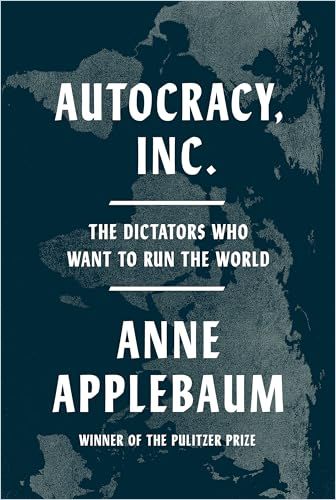Pulitzer Prize winner Anne Applebaum — who is also the author of Gulag — details how today’s dictators grow rich as their citizens suffer.

Sanctioned Theft
The world’s autocrats are a canny bunch, Atlantic magazine’s Pulitzer Prize winner Anne Applebaum writes in this slim but robust study. They’ve adapted to the democratizing force of information technology by building powerful domestic security systems, sabotaged international sanctions by trading among themselves, and allowed global pariahs such as Venezuela and Cuba to get what they need from China and Russia.
Autocracy
In the 21st century, autocratic states cooperate through interdependent financial, security, and technology networks. Today’s autocrats amass fortunes through secrecy and the repression of accountability. The rulers of Venezuela and Belarus, for example, survive by undermining democratic institutions and quashing free speech.
Unlike the fascist and communist leaders of the past, who had party machines behind them and did not showcase their greed, the leaders of Autocracy, Inc., often maintain opulent residences and structure much of their collaboration as for-profit ventures.
Anne Applebaum
The West locked Venezuela’s brutal regime out of the global economy, but strongman Nicolás Maduro receives loans from Russia, gets security technology from China, and has Turkey’s help in trading gold around the world. Cuba and Venezuela have both cast criticism of their policies as evidence of foreign enemies attempting imperialistic overthrows of their governments. Beijing violently oppresses its Uyghur population, and Tehran treats women harshly. Syria, Belarus, and Venezuela despots let the majority of their citizens face poverty and violence.
After Hugo Chavez took power in Venezuela in 1998, his chief of internal police, Jesús Urdaneta, found that Chavez’s new government officials were corrupt. Urdaneta had helped Chavez plan a coup in 1992 that failed, and the two had been imprisoned together for their fight against corruption. Yet Chavez asked Urdaneta to resign. Chavez wanted power, and he surmised that dirty officials would be more loyal to him than honest public servants.
Like Putin, Chavez slowly broke democratic institutions in Venezuela — the press, the courts, the civil service, various ombudsmen — even while proclaiming his belief in democracy.
Anne Applebaum
The Venezuelan state devolved into a kleptocracy. While Chavez spent some of the state oil company’s revenue on social programs, he enriched himself and his cronies. By 2021, Swiss banks held some $10 billion in assets for Venezuelan functionaries — a fraction of the estimated hundreds of billions the regime stole before Chavez’s death in 2013.
Empty apartment buildings stand throughout Venezuela. Those who stole money from the state needed somewhere to stash it, and investing in buildings seemed a good idea — if Venezuela’s economy ever recovers, they will sell or rent this housing. Yet many Venezuelans are starving to death. Schoolchildren spend their lunch breaks hunting birds and iguanas. In 2019, reportedly 41% of Venezuelans had gone without a meal for days.
As Western democracies imposed sanctions, Russia and China kept opposition forces from ousting the corrupt regime. Venezuela imported grain, gasoline, and arms from Russia. China offered $30 billion for an unnecessary, never-completed high-speed railway. Cuba provided soldiers and police personnel, and Turkey and Iran became active trading partners.
China and Russia
In 1989, the Tiananmen Square protests provided dramatic proof that some in China wanted freedom of speech and the rule of law. Beijing violently quashed the demonstrations and leveraged technology to ensure that Western ideals never took hold in China. The nation launched a system of digital information suppression known as the Great Firewall. The system censors responses to phrases such as “Tiananmen” and “1989,” along with any content the government deems problematic. Yahoo, Cisco, and Microsoft were among the American tech giants that cooperated with China’s surveillance and information-suppression policies.
China refined the Great Firewall and banned Facebook in 2009, then Instagram in 2014. China created a network of security cameras in cities nationwide. Artificial intelligence powers biometric software that recognizes the faces of Chinese citizens. A “social credit system” tracks people’s speech and actions, and punishes those who criticize the regime. By erasing any mention of democracy from public and private discourse, China hopes to suppress civil rights, free speech, and open elections.
Vladimir Putin characterizes the United States as hypocritical and unscrupulous, and Russia as an enlightened nation that will save the world from US hegemony.
Global War
Modern autocrats sometimes kill their opponents, but most understand that disinformation campaigns can reliably shut down dissent. In 2016, Zimbabwean pastor Evan Mawarire made a video of himself denouncing the regime in Harare while wearing a national flag over his shoulders. His video went viral and led to a nationwide strike. Zimbabwe’s leaders smeared him as a traitor and scam artist controlled by outside forces. Zimbabwe’s leaders could have killed Mawarire; instead, they drove him into exile.
After Iranian soldiers opened fire on demonstrators in 2009, Iran’s government insisted the protestors were not Iranians but “plotters” in league with “foreign media.” Hugo Chavez painted his domestic detractors as right-wing imperialists planted by Washington, DC. Putin has blamed domestic unrest on Western foes such as George Soros or Hillary Clinton. China built ties in Latin America and Africa. Russia recruited Cuban soldiers to fight in Ukraine, and deputized Viktor Orban and Donald Trump followers to block US aid to Ukrainian forces.
The autocracies keep track of one another’s defeats and victories, timing their own moves to create maximum chaos.
Anne Applebaum
The US State Department’s Global Engagement Center tracks Russian misinformation campaigns and calls attention to them before they launch, a tactic known as “pre-bunking.” Under Elon Musk’s ownership, X amplifies illiberal messaging. Nonetheless, pro-democracy advocates continue their worldwide push for transparency and freedom to fight the world’s autocrats.
Review
Applebaum makes a compelling argument that the democratic world needs to get wise to despots’ playbooks, which interlock corruption with bedrock opposition to their citizens participating in government. She underscores that today’s dictators — no matter how they label themselves — are not ideologues: They want money, vast quantities of it, and regard the nations they rule as their personal piggy banks. Applebaum’s detailed reporting proves depressingly evocative, as she paints a world in which a few leaders will happily let their citizens starve or die from lack of medical care, as long as the tyrants can line their pockets. Students of foreign affairs, policymakers, investors, and activists will learn much from Applebaum’s informed overview.









